Tomorrow is election day in Sweden, and a very important day for Swedes. Their nation, with the most grotesquely swollen welfare state in the world, faces a huge fiscal and demographic challenge.
But the prospects for a change in direction after tomorrow are not good. Sweden is almost a one-party state, and the Social Democrats (Socialdemokraterna) have bought and paid for their permanent position of power with ever-increasing welfare benefits.
Regular Swedish reader LN sends us this report about the state of Sweden on the eve of the election. Unfortunately, since our ISP is still down, I have not been able to include the excellent graphs and photos that accompanied his report.
The title of this piece is a translation of the Social Democrats’ campaign slogan: Alla ska med. Så enkelt är det.
As with his previous reports, I have adjusted LN’s spelling and altered some of his phrasing to accord with current American idiom. Otherwise, the story is entirely his.
About the Swedish Phony Election This Sunday
Sweden is a small country. The 9 million inhabitants do not constitute more than 0.14% of the world’s population. The immigrant population amounts to just over 2 million, or 22% of the entire population and the native-born (the Swedish) population — nowadays called: “persons with a Swedish background ” — to just over 7 million in 2004. According to SCB’s (Central Bureau of Statistics ) forecasts, the immigrant population will increase to approximately 50% by about 2015-2020 — a sweet future.
Sweden is approximately equal in population to N. J., USA, to Austria or the Dominican Republic. This fact urges consideration of how small an impact Sweden has on the world economy and on how the global economy influences Sweden. A lot of what is happening in Sweden is directly influenced by what takes place in the rest of the world. A fall at the Stock Exchange of Tokyo, one revolutionizing invention made in California, a decision in the EU-Parliament in Brussels, devastation of the Brazilian rain forests, an accelerating melting down of the polar glaciers, an act of terror in New York, war in Iraq, or a cheaper labour force in China, India or eastern Europe are occurrences that characterize the Swedish everyday life.
The accelerating globalization creates new and extended markets, but requires even more far-reaching domestic structural transformation. The work-intensive industry and to an accelerated degree the skill-intensive service sector are set for ever-harder competitive pressure from outside. Sweden’s future possibilities for creating employment and welfare are largely depending on how well the government succeeds in creating a friendly and functional climate for innovative individual entrepreneurs, for the export industry and for the developing competitiveness of industries and regions.
The ability to renew production goes hand in hand with the job-annihilation that occurs through structural transformations. In large parts of the country the exporting and closing-down of jobs are stronger forces than the job-creating ones, resulting in an accelerated unemployment and an increased need for labour market policy initiatives and everything else that might stem the need for additional early retirement pensions!
Demographics
Sweden has a relatively old population. 17% of the population are today over 65 years, a proportion that will grow to 23% in 2050. The big batch of people born in the 1940s, which the Swedish Minister of Finance Nuder unfriendly calls the “Meat-Mountain”, and which begins to claim pensions in the near future, contributes to a regeneration of the age group 65+ from on average 75.7 years in 2003 to 74.7 years at the start of 2010. The proportion of those over 80 years, will increase from 5.2 to 8.4% during the period.
The proportion of children and young people in the ages 0-19 years will remain relatively constant during the next 50 years. SCB’s population forecast points to a reduction of the proportion from 24 to 23%.
Approximately 59% of the population belong to the fit-for-work age group 20-64, which is the lowest in the entire OECD. Only Greece, New Zealand and Ireland have a lower proportion of the 20-64 age group.
Around 45% of the Swedish population is working, compared to 35 in Greece and 51 in Switzerland, which means that every working person must first provide for him/herself then also provide for 1.2 other persons — either child, elderly or a 20-64 year old person not working.
The number of early retirements has now risen to new historical levels and in 2004 amounts to 540,000 persons, nearly 10% of the fit-for-work population. Those that are on long sick-leave in 2003 achieved a top level of 130,000.
Unemployment
“Open unemployed” means those that are at the labor market’s disposition and are actively seeking jobs and thus entitled to compensation from an unemployment benefit society. When you measure how big this group is, it is common to speak about the proportion unemployed in percents of all on the labor market (working plus unemployed). However, the common proportion of unemployed, and those granted a premature pension also can be measured in relation to the population 20-64 years. That is done here.
In 2004 231,000 persons, corresponding to 4.4% of the age group 20-64, were open unemployed. More men (4.9%) than women (3.8%). The unemployment is highest among the young (6.2% for age group 20-34). With rising age, the unemployment declines. 0.9% are unemployed for more than 6 months a year.
If we add together the open unemployment of 231,000 persons and those persons that make use of actions taken due to the state of the market and due to the welfare service for disabled , the total unemployment is 394,000 corresponding to 7.4% of the 20-64 age group — among men 8.4%, and among women 6.4%.
The number of beneficiaries getting early retirement pension, sick-leave allowance, unemployment benefit/allowance, activity support due to labour market measures and social allowance/assistance should every year be calculated by the Central Bureau of Statistics (SCB ) and the figures then recalculated to whole-year-equivalents.
In 1990 732,000 persons were drawing such benefits. In 1994 the number had increased by 58% to 1,156,000 persons. Today’s SCB figures are not known. Since then the number of beneficiaries drawing social allowance/assistance (socialhjälp) and activity support due to labour market measures has been reduced. Despite this, at the turn of the century there were still 41% more beneficiaries than in 1990. The reason for this is that more people are getting early retirement pension and long-term sick leave allowance .
Approximately 531,000 or 59% of the population belong to the fit-for-work age group 20-64. Of these approx. 405,000 are working. More than a million people do not work; that is, either they have not got a job, are studying, are unable to work, are sick, disabled or just “damn lazy”. Why work when the benefit per day is just $10-15 lower than the work wage?
Sweden has long been praised for its active labor market policy, i.e. a policy that took into consideration the different states of the job market and tried to help the unemployed with complementary education (AMU ) etc. in order to increase their opportunities to get a job quickly on the open labor market. The active labor market policy reached its height during the 1980s, when the unemployment was low.
Benefits for unemployment and ill-health cost the national economy incredible sums each year. In 2004, when the total was higher than ever before, the expenditure was SEK 121,000,000,000. It corresponds to almost 5% of the GNP or 18% of the state budget.
That means that each and every individual in Sweden must pay in mean-value SEK 13,416 in tax-compensation.
Vacant jobs are mediated by the almost 400 State Employment Offices (Arbetsförmedlingar). The National Audit Bureau has cruelly criticized the Labor Market Board (AMS ), the responsible authority, that the State Employment Offices do not do their job. According to information that has leaked out, only one of ten free jobs are mediated and every work agent does not mediate more than 7-8 jobs a year!
The Swedish Nomenklatura
The number of employees within the bureaucracy amounts to 230,976 persons. 6-7% of all employees in the country are thus top public servants. The increase has been extremely fast these last years — since 2000 we have got more than 1,588 new public servants. Sweden has a pronounced nepotistic nomenklatura. Everyone is friends with, related to, and intermarried with or just [verb deleted — you guess!] each other in one limitless network as per a complex wiring diagram, like in an old railway signal-box, in this case the public signal-box .
To the top bureaucrats you have to add the lesser primary and secondary bureaucrats of the municipalities, at least just as many, which means that the total number amounts to between 10 -15% of the country’s total labor force.
Persons with foreign background
The immigrant population of 2 million, or 22% of the entire population, has a lower employment level than the population as a whole. Especially those who are born outside Europe (approximately 6.5% of the population group aged 20-64 years).
According to the Swedish Immigration Board (Invandrarverket ), the employment rate in the group that is foreign born (inside as well as outside EU) is about 60%.
According to the Central Bureau of Statistics (SCB ) the foreign-born part of the population is 1,100,262 — oops, didn’t the immigrant population amount to just over 2 million? — and of these 831,825 are in the fit-for-work age group (18-64). Therefore — with simple mathematics — 332,730 foreign-born persons in the fit-for-work age group are not working but are directly dependent on maintenance from the state and the municipality in form of social allowances or early retirement pensions .
499,095 are, however, “working”, therefore they either have a real job (how many?) or they are working in cost-requiring labor market measures, alternatively are underemployed or are studying. Of those “working” — this is a spiteful guess — only some 200,000 have got a real and serious job and therefore are able to support themselves and contribute to the Public Treasure.
Why these different figures, and how does the above agree with what earlier has been said about a total unemployment of 394,000 and a total working force of in the ages 20-64 of 531,000? Something does not tally! Double entry bookkeeping could be one explanation. The Central Bureau of Statistics (SCB) has in collaboration with the Swedish Migration Board (Invandrarverket) made native-born persons with one native- and one foreign-born parent into Swedes by establishing the concept of “person with Swedish background”. This partial group constitutes about 7 per cent of the entire population. The consequence of the fact that one native-born, with one native- and one foreign-born parent, statistically are considered being “Swedish”, is that the sum of “persons with foreign background” is reduced to just over 1.4 millions or to 16% of the population, instead of 2 million and 22% respectively. This is one example of how the untrustworthy Government with all its might is trying to conceal from the people the real proportions and the costs for multiculture and immigration.
340,000 immigrants have such poor knowledge of Swedish that they find it impossible to function fullly in society. 20,000 of those who have come to Sweden the last 20 years have such serious reading/writing difficulties that they should be considered as illiterates. Less than half of those who have been granted residence permits start their free (but not yet(!) compulsory) course in Swedish for Immigrants (SFI ) within a year. 40% of the SFI-pupils are shirking the Swedish language training.
The Education Fraud
Once upon a time a university was founded — in Uppsala AD 1477.
Then in AD 1666 the next university was founded — in Lund. Then came the University of Linköping in 1975. Thereafter followed a tiny avalanche of new universities. Today there are more than 20 universities and an unknown number of ‘university colleges’ in Sweden.
A general reduction of academic quality has occurred. The old ideals of creative and critical thinking, liberation and emancipation have been devaluated. The title of “Professor” is served out as an award to film directors and authors, in an conscious effort to clean away any stamp of élitism. Politicians of great merit are being taken good care of; for example the Prime Minister, after having granted the Örebro University another SEK 140,000,000 yearly, became doctor honoris causa at the same educational institution.
“We Social Democrats have undertaken one very ambitious obligation by increasing investment for research to one percent of GNP. With Sweden’s considerable growth this will mean a future additional substantial resource boost”, said Leif Pagrotsky, Minister of Education.
On his own authority the notorious Minister of Finances Nuder lately said:
“I want to see more universities in Sweden. I want to see a Sweden of Knowledge, Competence and Creativity!
Sure, for a true Marxist there exists no Gaussian-curve depicting the standard distribution of human intelligence — everybody can learn everything, anywhere. That is why Swedish academicians with 3-4 years at the University and with around SEK quarter of a million in study-loans are frying hamburgers at McDonalds, selling bookshelves at IKEA or distributing newspapers in the early morning.
Eureka: the more young people that are studying with borrowed money, the smaller unemployment figures to account for at the present moment; at least 50% of the youth are expected to devote themselves to higher education.
Multiculturalism
The immigrant’s vote is becoming ever more important in Europe. In many countries foreigners are allowed to vote in local elections (in addition to all those thousands of immigrants who have been granted citizenship and are voting to a parliament).The immigrants to Sweden — not refugees — are not different from other immigrants to Western Europe, who arrive here perhaps first of all to get a job and earn a living, but also to a large extent enjoy the generous welfare benefits. When established and settled down, they of course vote in favour of maintaining the welfare system. Why bite the hand that feeds them? The sitting Swedish Social Democratic Government tries to remain in power by appealing to all recipients of public welfare (with Swedish as well as with foreign background). With the prominent help of their supporting two sects, the Greens and the Lefts, they are fleecing the working Swedes to maintain a big sponging immigrant population. Swedish society can probably be fleeced at least for another one or two voting periods. Generous welfare benefits attract more and more people and when the share of the idle population grows big enough, the tax burden for the remaining work-force must make working become unprofitable. Hopefully this will soon happen and cause the system to collapse.
Most repulsive is the Swedish Social Democrats’ perfect understanding with the Muslims. The Swedish public service television (SVT) program “Assignment Scrutiny” (Uppdrag Granskning) exposed that Mahmoud Aldebe, chairman of the Swedish Muslim Association (SMF), which was (is?) a part of the extensive umbrella organization “the Muslim Council of Sweden” (SMR), after the 2002 election sent a congratulatory letter to the Swedish Prime Minister, the almighty Göran Persson.
Here follows a small excerpt of that letter:
“The Muslims congratulate you on your victory in the ‘success-election’. We Muslims and many of our representatives around the country have worked hard for an (s)-victory and have increased Muslim participation in the election, specially in Stockholm. The polling measurements pointed to at the most 38% but together we turned it to an (s)-victory of over 40%. We Muslims wish you success and happiness for the 4 years lying ahead. We hope that you in the future will meet some of the Muslims’ requirements.”
The Social Democrats thus have chosen to ally themselves with Islamists and to wink at their undemocratic views. Prominent characters of Muslim parishes are also active within the Social Democrats, and the relationship with the Christian (sic!) falange (division) of the Social Democratic Workers Party (SDAP) called Broderskapsrörelsen (the Brotherhood ) is excellent. Since 2003 and through a SDAP-congress decision it is possible for Muslims to become members.
Perhaps the Social Democrats in their turn, and maybe as a thanks for the assistance they get from the mosque management, have shown a tendency to disregard and to shut an eye to the fact that extremism is easy to find in certain of the mosques. This has given the Muslim Brotherhood free scope to force their ideology on to the mosque-visiting Muslims.
The Swedish Social Democrats, Islam’s useful idiots, just as the residual politically correct establishment, evidently are ready to sell out the country to the hostile and misanthropic religion Islam.
* * * * * * * * * * * * * * *
In memory of Oriana Fallaci I take the liberty to cite a few words of this great woman of vision.
“Europe is no longer Europe, it is ‘Eurabia,’ a colony of Islam, where the Islamic invasion does not proceed only in a physical sense, but also in a mental and cultural sense. Servility to the invaders has poisoned democracy, with obvious consequences for the freedom of thought, and for the concept itself of liberty. The current invasion, is carried out not only by the ‘terrorists who blow up themselves along with skyscrapers or buses’ but also by the immigrants who settle in our home, and who, with no respect for our laws, impose their ideas, their customs, their God.”
* * * * * * * * * * * * * * *
All the graphs [missing from this version] and most of the statistics in the above exposition are taken from a report “Everybody is Needed “ (Alla Behövs) by the Swedish Confederation of Trade Unions’ (LO) own (but former) investigator: Jan Edling.
The Swedish newspapers SvD and Aftonbladet on 18th of May 2005 wrote: “The Swedish Confederation of Trade Unions (LO) do not want to approve his report:40% have no jobs. Many more than earlier was believed are put on the sick-list because there are no jobs. This bombshell comes from one of the Trade Union Confederation’s own investigators. Now he gives notice in protest against the fact that his shocking report is not approved of.
“Jan Edling has worked 18 years for the Swedish Confederation of Trade Unions and is one of this organisation’s most experienced investigators. Before then he worked as a sociopolitical investigator at the Social Insurance Association (Försäkringskasseförbundet ). It was there he first detected the connection between high unemployment figures and high numbers of people being reported sick or having got early retirement pensions.”
[…]
“Jan Edling’s latest Trade Union Confederation Report contains such politically sensitive figures that the Trade Union Confederation do not want to approve it, claims Edling. The reason: “According to Edling only 60% of the Swedes are working”. Four out of ten Swedes have no job — and the figures distributed per municipalities give clear signals that it is about lack of jobs, not extreme high illness figures.
“That only six out of ten are working is moreover a considerable higher figure than the government’s official one, that asserts that 77% of the Swedes are in work.
Edling’s figures are sensitive. In, for example, Haparanda (far to the north) the number that get compensation for ill-health or unemployment is shockingly high, 40.9%. The average for the country is 20%. […] This is hugely controversial and not the least because it is near election time. [ …] That the investigation would be politically sensitive is denied by both the Swedish Trade Union Confederation (LO) and the Minister of Labor Karlsson.”
But, Labour Market Policy by itself has never created any jobs!
In total, more than 19.7% of the population in the age group 20-64 receive payments for unemployment or ill-health. In Haparanda 40.9% of the population receive such payments.
This dramatic figure in Jan Edling’s report supposedly caused prominent Social Democrats and the management of the Trade Union Confederation to get the jitters.
The age-group 20-64 make use of 45.6% of all public expenses.
One fourth of these expenses are benefits for unemployment and ill-health . Why these expenses are prognosticated to reach a maximum in 2006 is not explained.
Taxation
In Sweden we have got the highest taxes — mean value 54% (back in the 60s it was slightly more than 20%), and we have the most penetrative bureaucracy in the world.
Little room for individual freedom is left and real democracy based on ideologies must give way for mock democracy based on bargaining — with the wallet as deciding factor.
Power, might and glory the Social Democrats exercise with the help of two small sects: the Green Party and the former Communists — now the Left Party (increasingly reactionary). Not seldom the tail is wagging the dog!
Each inhabitant in Sweden, young as well as old, is charged for the cost of ill-health and unemployment that amounts to SEK 13,416 — excluding children and elderly, it must become at least double for persons in the fit-for-work age group 20-64.
Once again — this is an average tax charge of SEK 26,000 ($ 3,560) or more on each working person in Sweden. But of course it is not the only tax. Taxes are imposed on everything, even dying.
Do we still wonder where the tax-money goes?
We have constantly been made to believe by our untruthful ELITE that most of the tax-money went to:
PUBLIC MEDICAL SERVICE — SCHOOLING — ELDERCARE
This has grown to a mantra: VÅRD-SKOLA-OMSORG — VÅRD-SKOLA-OMSORG — VÅRD-SKOLA-OMSORG…
Jan Edling with his investigation has killed the myth. People without a job or otherwise not well-favoured by society in the age-group 20-64 consume 45.6% of all public expenditure.
Now with one day left to the election you can still read everywhere on all the election placards and posters and the fluttering flags of the Social Democrats the stirring political message:
“alla skall med — så enkelt är det”.
“everybody must come along — it is that easy”.
The benefit dependency is the Social Democracy’s biggest asset. Prime Minister Göran Persson lacks the ability to see as a huge human tragedy the fact that up to 1.5 million people in the fit-for-work age group are forced to live on contributions. The Social Democrats never will have benefit IN-dependency as their objective and aspiration. Instead they will increase the number of subjects dependent on state assistance to maybe two or even three million people. These will be the Social Democrats’ strategic voter reserve, that always can be mobilized. Prime Minister Göran Persson and the Minister of Finances Nuder says: “The benefit dependency, it is our agency, our political innovation. The dependent ones are our people.”
As has been stated previously, an important source for this exposé has been the LO-report “Alla behövs” (Everybody is needed) by Jan Edling. Some material and a lot of inspiration I have found on one of Sweden’s most readable and humorous blogs: Östra Ölands fria horisont maintained by author and journalist Kurt Lundgren, who has diligently followed the pre-election activities in his home town Kalmar. In conclusion I willfully permit myself to cite him word for word:
Summary: After having in proper order listened to the Minister of Justice Tomas Bodström, Minister of Environment Lena Sommestad and Prime Minister Göran Persson I can establish that the Social Democratic Politics does not aim at the part of the population that support itself, but is bent on the big segment of society that is dependent on allowances. Here you find the election dividends, not among those who earn their own livings — a group that is more or less a nuisance for the politicians. The S-MIGHT therefore is eternal — this has been a very profitable political investment.
Minister Bodström eight times pointed out that if you do not vote on us, the Right Wing Alliance will take away your allowances.
Minister Sommestad tempted with ‘energy contributions’ to those house-owners that exchange their boilers, “take the opportunity now, else the right wing will take away the state-contributions!”.
One whole hour Prime Minister Persson spoke about allowances and not one word about business activities or any private enterprising spirit.
The climax was reached when he called out “You are entitled to early retirement pensions…”, whereupon a gale of applause broke out. According to my simple opinion the entire spectacle was not quite normal, not at all mentally sound. I wonder if there is another country like ours — I do not belong here any longer!
Democracy and normal political transfers of power are no longer feasible in Sweden.
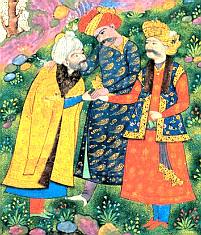 Last Saturday Northeast Intelligence Network posted an interview with Al Qaeda leader Abu Dawood. According to the report, Abu Dawood summoned Pakistani journalist Hamid Mir by cell phone, and the two met on the outskirts of Kabul, at the tomb of Sultan Mehmoud Ghaznawi, on September 12th.
Last Saturday Northeast Intelligence Network posted an interview with Al Qaeda leader Abu Dawood. According to the report, Abu Dawood summoned Pakistani journalist Hamid Mir by cell phone, and the two met on the outskirts of Kabul, at the tomb of Sultan Mehmoud Ghaznawi, on September 12th.

 September 16th was Mexico’s independence day, so principal Sam Williams of Velasco Elementary School in Clute, Texas had a
September 16th was Mexico’s independence day, so principal Sam Williams of Velasco Elementary School in Clute, Texas had a 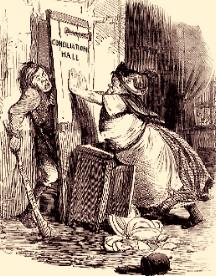 President Bush was seen as “conciliatory” towards Islam in his
President Bush was seen as “conciliatory” towards Islam in his  Thailand’s prime minister has declared a “severe” state of emergency after rumours of a military coup swept the capital and tanks reportedly took position outside government headquarters.
Thailand’s prime minister has declared a “severe” state of emergency after rumours of a military coup swept the capital and tanks reportedly took position outside government headquarters.
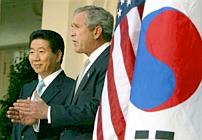 It seems as though President Roh has been romancing North Korea and things have been getting chummy. Roh was in Washington recently for a most unceremonious meeting with President Bush, and the long marriage between America and South Korea did not appear to be ending happily. Mr. Higham, of the aforementioned blog, has excerpts from an essay in
It seems as though President Roh has been romancing North Korea and things have been getting chummy. Roh was in Washington recently for a most unceremonious meeting with President Bush, and the long marriage between America and South Korea did not appear to be ending happily. Mr. Higham, of the aforementioned blog, has excerpts from an essay in  The Social Democrats’ slogan was Alla ska med. Så enkelt är det. It means “Everybody must come along. It is that easy.” (Some readers prefer to translate Så enkelt as “that simple”).
The Social Democrats’ slogan was Alla ska med. Så enkelt är det. It means “Everybody must come along. It is that easy.” (Some readers prefer to translate Så enkelt as “that simple”).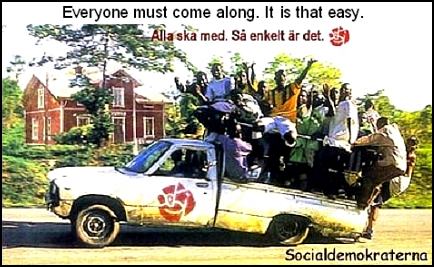
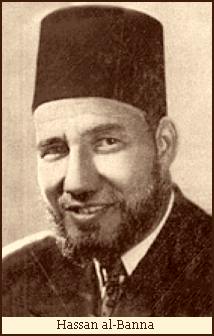 These words are not from Al Qaeda; they are part of a program that the founder of the Muslim Brotherhood Hassan al-Banna formulated in a speech. The Brotherhood has millions of members and has spread far beyond Egypt. Their intellectuals are active in Europe and the United States; they are considered “moderate” and are accorded recognition as such in the media. The planned recapture of “lost” areas belongs to the political program of states who consider territorial power struggles essential, i.e. in a political arena. How can this be in the program of a religion?
These words are not from Al Qaeda; they are part of a program that the founder of the Muslim Brotherhood Hassan al-Banna formulated in a speech. The Brotherhood has millions of members and has spread far beyond Egypt. Their intellectuals are active in Europe and the United States; they are considered “moderate” and are accorded recognition as such in the media. The planned recapture of “lost” areas belongs to the political program of states who consider territorial power struggles essential, i.e. in a political arena. How can this be in the program of a religion? The photograph at right shows the ruins of the Agora at Izmir, a Turkish city on the Mediterranean coast of Asia Minor. “Wait a minute,” you say; “isn’t the Agora a feature of Greek cities?”
The photograph at right shows the ruins of the Agora at Izmir, a Turkish city on the Mediterranean coast of Asia Minor. “Wait a minute,” you say; “isn’t the Agora a feature of Greek cities?”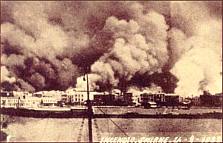 Until 1922, that is. The week of September 11-17, to be precise. During that period the city was occupied by the forces of Mustafa Kemal, a.k.a. Kemal Attaturk. The Christian areas of the city were looted and torched, and the Armenians and the Greeks were driven from their homes to flee the city or be slaughtered. Of the 400,000 Christians resident in the city beforehand, virtually none remained, and more than 190,000 were never accounted for. The Archbishop Chrysostomos was among the victims, murdered at the hands of a mob while under the “protection” of French marines. The city, except for the Turkish quarter, was reduced to a smoking ruin.
Until 1922, that is. The week of September 11-17, to be precise. During that period the city was occupied by the forces of Mustafa Kemal, a.k.a. Kemal Attaturk. The Christian areas of the city were looted and torched, and the Armenians and the Greeks were driven from their homes to flee the city or be slaughtered. Of the 400,000 Christians resident in the city beforehand, virtually none remained, and more than 190,000 were never accounted for. The Archbishop Chrysostomos was among the victims, murdered at the hands of a mob while under the “protection” of French marines. The city, except for the Turkish quarter, was reduced to a smoking ruin.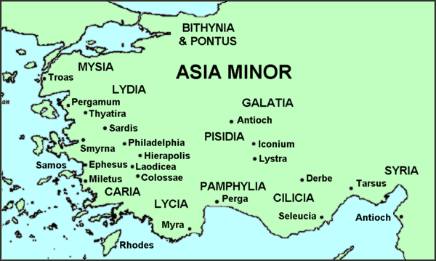
 The Greek Holocaust was a secular one, perpetrated by Turkish nationalists out to secularize the country, and not a product of jihad. Even so, the corpses strewn in the streets were all Christians, and were derided by their murderers as gâvur, the Turkish version of the Arabic word kaffir, or infidels.
The Greek Holocaust was a secular one, perpetrated by Turkish nationalists out to secularize the country, and not a product of jihad. Even so, the corpses strewn in the streets were all Christians, and were derided by their murderers as gâvur, the Turkish version of the Arabic word kaffir, or infidels. The agora was the transmission belt of our common culture, and the belt is now broken. The common values of our civilization are no longer being transmitted from generation to generation by the erstwhile guardians of the West.
The agora was the transmission belt of our common culture, and the belt is now broken. The common values of our civilization are no longer being transmitted from generation to generation by the erstwhile guardians of the West. Secondly, pull your kids out of the public schools. If you spend a couple of hours reading about the fashionable and dangerous Marxist thought being poured into the heads of your kids’ teachers at the schools of education, you won’t hesitate to get your children out of reach of the school system. Make the necessary sacrifice: keep one parent at home and do the
Secondly, pull your kids out of the public schools. If you spend a couple of hours reading about the fashionable and dangerous Marxist thought being poured into the heads of your kids’ teachers at the schools of education, you won’t hesitate to get your children out of reach of the school system. Make the necessary sacrifice: keep one parent at home and do the  Other than look at the headlines and check Memeorandum to see what themes are developing, I’ve avoided reading any details about the latest Papal smackdown. The headlines are familiar, the pictures of howling mobs of Muslims are by now simply stock photos, and in the end, I notice that no one is actually reading Benedict’s speech from Regensburg — or rather, they’re excerpting the “juicy” parts and leaving the rest. A waste, really.
Other than look at the headlines and check Memeorandum to see what themes are developing, I’ve avoided reading any details about the latest Papal smackdown. The headlines are familiar, the pictures of howling mobs of Muslims are by now simply stock photos, and in the end, I notice that no one is actually reading Benedict’s speech from Regensburg — or rather, they’re excerpting the “juicy” parts and leaving the rest. A waste, really.